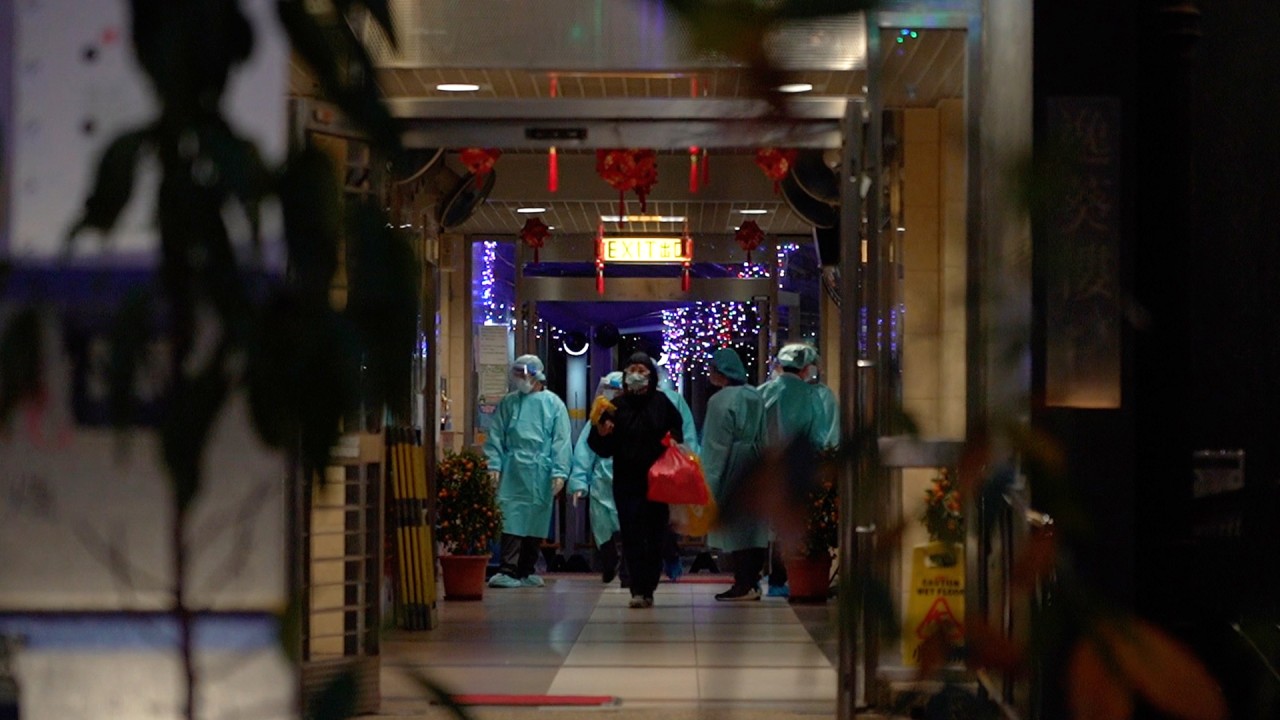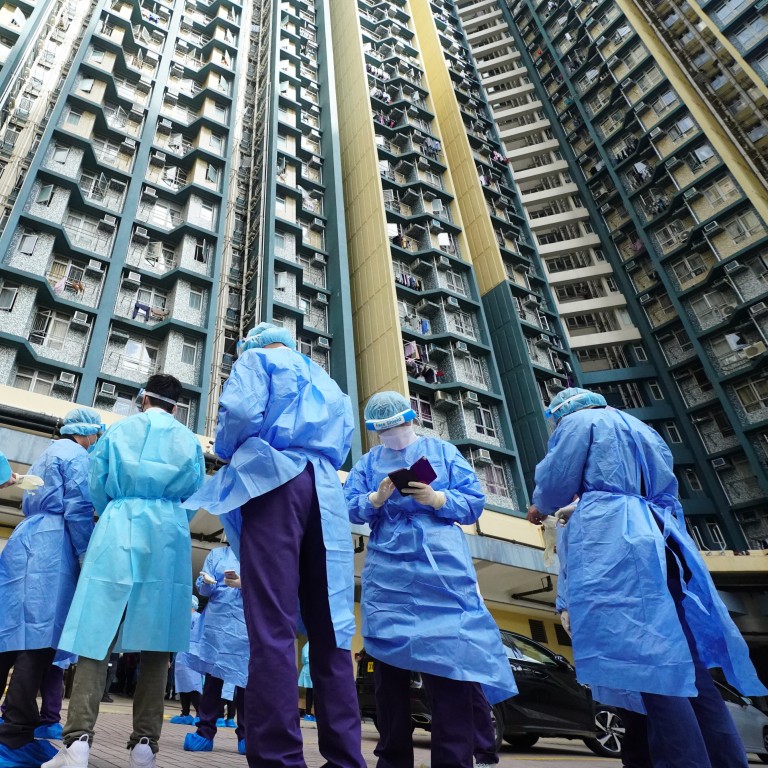
Omicron: Hong Kong confirms 140 new cases as expert says fifth wave may take 3 months to contain – and forget about easing social-distancing rules for Lunar New Year
- Top government pandemic adviser says the ‘escalating’ fifth wave of cases may take two to three months to contain
- Outbreak at Kwai Chung Estate has now hit 173 cases, including preliminary-positive infections
The alarming development came as a top government pandemic adviser warned the “escalating” fifth wave of cases could take two to three months to contain, while easing social-distancing measures around the Lunar New Year holiday was impossible.
Sunday’s daily figure was the highest since July 30, 2020, when 149 cases were recorded, the most the city had logged in a single day, at the height of the third Covid-19 wave.
Residents raise stink as rubbish piles up at Covid-hit Hong Kong estate
But unlike 1½ years ago, when daily caseloads were already in triple figures for a week before peaking, it took just one day this time for the number of infections to rise fivefold from a relatively low 26 on Saturday.
Of the infections confirmed on Sunday, 125 were locally transmitted, including 17 outside the estate and four with unknown sources. The other 15 were imported.
The estate outbreak, including preliminary-positive infections, has now hit 173 cases.
Officials had detected 126 and 41 infections, respectively, at the estate’s Yat Kwai House and Ying Kwai House by 12pm on Sunday, according to Secretary for Food and Health Sophia Chan Siu-chee, who said five-day lockdowns at each building would continue as scheduled.
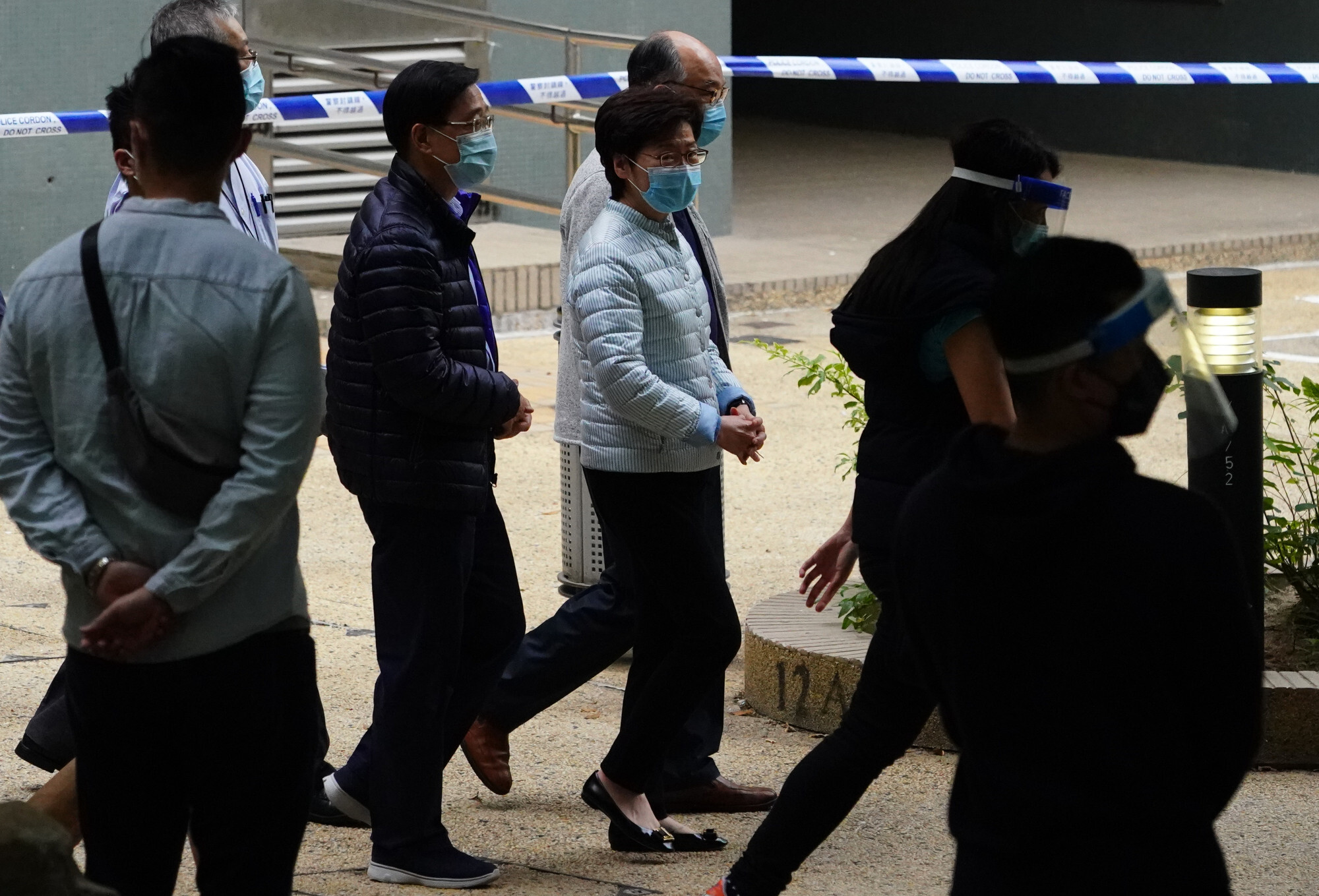
Nga Kwai House, with two infections, and Hiu Kwai, Yuk Kwai and Chin Kwai houses, which had one case each, were judged to be of “lower risk”, so their overnight lockdowns had ended, Chan said. Neighbouring Chun Kwai House also had one case.
The 10 other buildings on the huge 16-block estate, one of the biggest in the city and home to about 35,000 people, had been issued compulsory testing orders.
More than 100 people tested preliminary-positive on Sunday. The city’s overall confirmed tally stood at 13,286, with 213 related deaths.
On Saturday, Hong Kong leader Carrie Lam Cheng Yuet-ngor warned the outbreak at the estate was “exponential”. But on Sunday, the health secretary appeared to contradict her.
“Although the numbers are still increasing, we still have not seen a so-called exponential [rise],” Chan said. “Right now we think our different levels of compulsory testing are effective.”
However, respiratory medicine specialist Dr Leung Chi-chiu said that with the super-transmissive Omicron – which could see one patient infect eight others or more – an “explosive increase” in cases could still happen with “uncontrolled mixing” of people in the outbreak zone.
At the estate, tens of thousands formed long queues to get tested at mobile screening stations, sparking complaints about lengthy waiting times. Residents also grumbled about poor arrangements such as late meal deliveries at locked-down blocks and uncollected rubbish.
Angry residents heckled Lam, who visited the estate with her deputy John Lee Ka-chiu and housing secretary Frank Chan Fan, with some yelling profanities, telling her to “stop putting on a show”, while others sarcastically told her not to come as “you will be locked down for five days”.
Assistant Director of Housing Ian Luk admitted that litter strewn around the estate affected sanitation, but said the five-day operation was “unprecedented and challenging”, and a new cleaning contractor had been engaged.
But in another sign the fifth wave was sweeping across the city, a nurse who dispensed medicine at two homes for the elderly on the estate was confirmed as infected, resulting in 52 of their residents being sent to quarantine at the Asia-World Expo facility. At another home for the elderly, the Salvation Army Nam Shan Residence for Senior Citizens, a cleaner tested preliminary-positive.
Infections also reached hospitals. A patient-care assistant, who works in operating theatres at Prince of Wales Hospital, tested preliminary-positive on Sunday and was likely to have infected a colleague at Princess Margaret’s paediatric intensive ward after both gathered at his home on Kwai Chung Estate recently.
Four of Sunday’s confirmed cases were untraceable, including a lift repair worker who serviced malls in Wong Tai Sin and San Po Kong. A customs officer who recently took part in a departmental press conference also tested preliminary-positive.
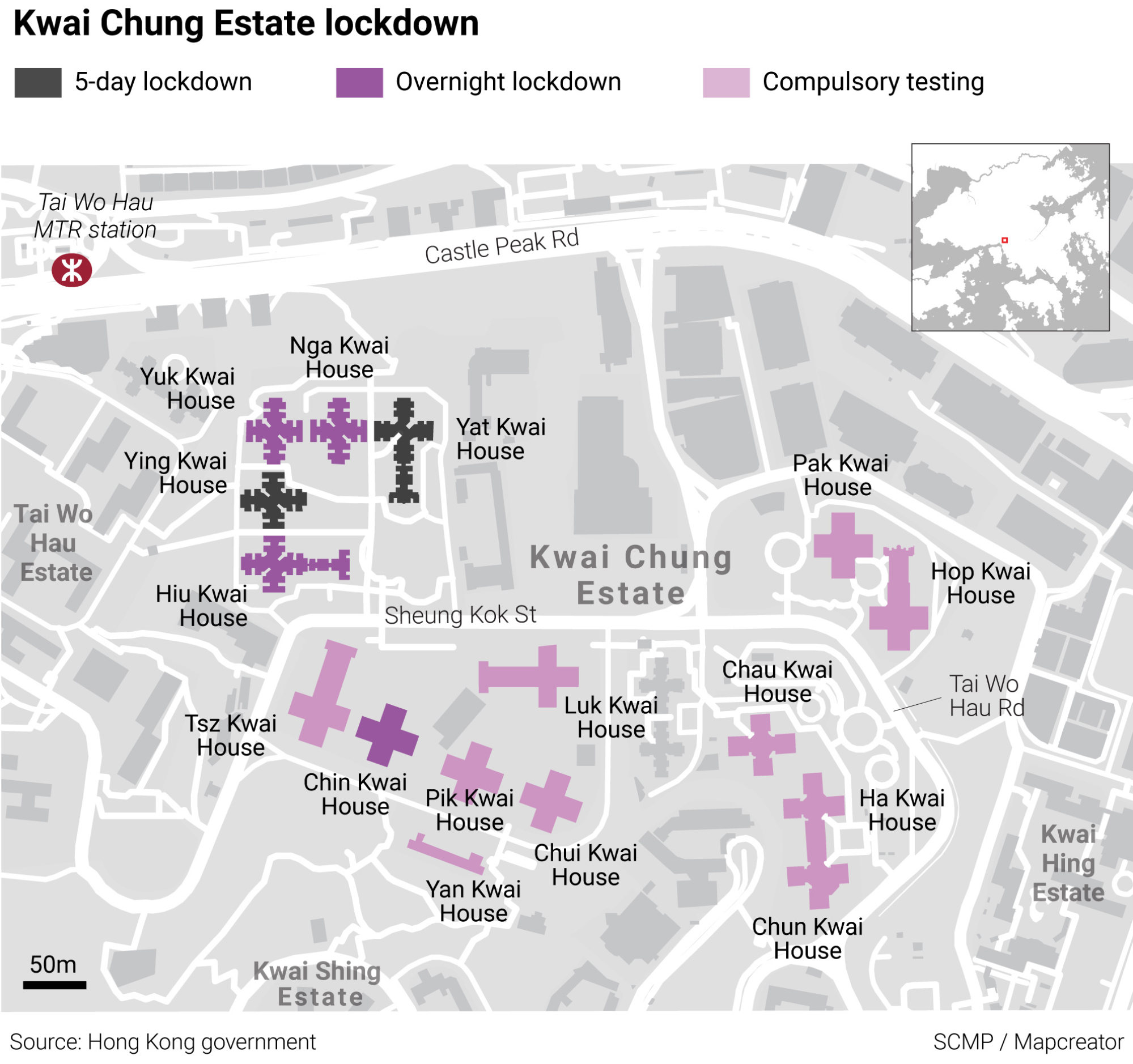
Microbiologist Professor Yuen Kwok-yung earlier on Sunday said that cases would continue to be uncovered in the next seven to 14 days after more than 100 residents of buildings at the estate were found to be infected with Omicron. Another 13 people citywide were caught up in a Delta cluster linked to local pet shops.
“It’s obvious that the fifth wave is escalating … It may take around two to three months to calm down,” Yuen told a television programme. “We have to see if our existing measures are effective enough, and hope there can be relatively fewer infections during the outbreak.”
Yuen suggested residents wear two masks when heading out for tests to prevent air leakage, and encouraged them to open the windows in their flats to improve ventilation.
Omicron: testing ordered for 35,000 public housing residents in Hong Kong
The outbreak at the estate has been traced to an unvaccinated man who is believed to have contracted the coronavirus from his wife before visiting Yat Kwai House on January 13 to collect items from refuse stations to resell in Sham Shui Po.
The wife, who had recently returned to the city from Pakistan, tested positive for the highly transmissible Omicron variant days after her three-week quarantine at the Silka Seaview Hotel ended, leading experts to believe she had caught Covid-19 from a fellow guest through cross-infection.
Yuen added that it would be two weeks before it was known how much the cluster involving the Delta variant would spread. The outbreak was first tied to a 23-year-old woman who worked at the Little Boss pet shop in Causeway Bay, with officials pinning the case on suspected animal-to-human transmission.
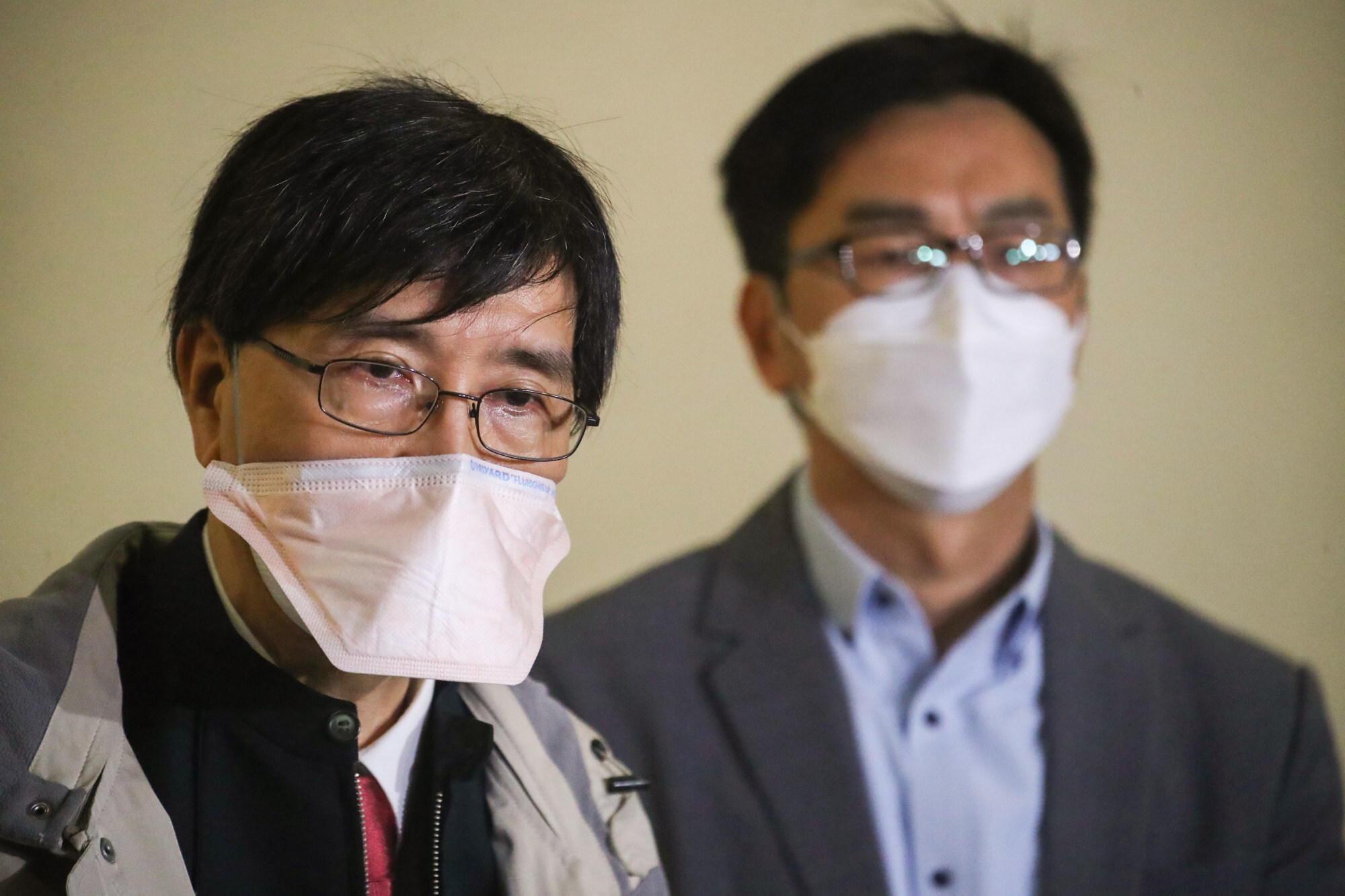
The hamster cull sparked by the discovery continued over the weekend, with another pet – one of 77 surrendered by residents so far – testing positive for the virus, according to the Agriculture, Fisheries and Conservation Department.
As of Saturday, a total of 2,512 animals, including 2,229 hamsters, had been humanely dispatched, it added.
Meanwhile, the public could forget about social-distancing restrictions easing up by the fourth day of Lunar New Year, Yuen said, echoing Lam’s remarks on Saturday that the chance of relaxing the measures was “rather slim”.
“You don’t need an expert to confirm this; everyone can see it’s obvious that it is impossible to open up by day four. There are already more than 100 cases discovered,” he told reporters.
Social-distancing rules were recently extended until at least February 4, with dine-in services banned in restaurants after 6pm and 15 types of premises, including gyms and beauty salons, closed entirely. Lam had also announced abrupt cancellations of traditional Lunar New Year fairs across the city.
Yuen on Sunday reiterated that Hong Kong’s “zero-Covid” strategy was not sustainable, as it was just meant to buy time for residents to get vaccinated so the city could open up and start living with the virus.
Almost 78 per cent of the population have received their first dose.


